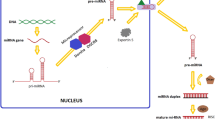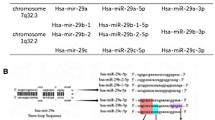Abstract
Background
MicroRNA (miR)-184 has been reported to have a dual role in human cancers. However, the role of miR-184 in non-small cell lung cancer (NSCLC) remains unclear.
Methods
Wild-type or mutant CDC25A promoters were constructed by PCR and site-directed mutagenesis to verify whether miR-184 could inhibit CDC25A expression at post-transcription level. Boyden chamber assay was used to assess whether miR-184 could modulate cell invasiveness via targeting CDC25A and c-Myc. We utilized 124 tumors from NSCLC patients to determine miR-184, miR-21, PDCD4 mRNA, c-Myc mRNA, and CDC25A mRNA expression levels by means of real-time PCR analysis. The prognostic value of CDC25A, c-Myc, and miR-184 on overall survival (OS) and relapse-free survival (RFS) was evaluated by Kaplan–Meier and Cox regression analysis.
Results
MiR-184 suppressed CDC25A expression by enhancing the instability of its mRNA as a result of miR-184 binding to its coding region. An increase in CDC25A expression by means of a reduction in miR-184 promotes cell invasiveness. Moreover, a concomitant increase in CDC25A and c-Myc expression as a result of decreased miR-184 via the miR-21-mediated PDCD4 reduction is responsible for cell invasiveness. Among patients, miR-184 expression in lung tumors was found to correlate negatively with CDC25A mRNA, c-Myc mRNA, and miR-21 expression, but was positively related to PDCD4 mRNA expression. High-miR-184, High-CDC25A, or high-c-Myc mRNA tumors exhibited shorter OS and RFS periods than their counterparts. The worst OS and RFS were observed in low-miR-184/high-CDC25A/high-c-Myc tumors, followed by low-miR-184 /high-CDC25A, low-miR-184/high-c-Myc, high-c-Myc, and high-CDC25A tumors.
Conclusions
MiR-184 as a tumor suppressor miR inhibits cell proliferation and invasion capability via targeting CDC25A and c-Myc. Low miR-184 level may predict worse prognosis in NSCLC patients.




Similar content being viewed by others
References
Meng F, Henson R, Wehbe-Janek H, Ghoshal K, Jacob ST, Patel T. MicroRNA-21 regulates expression of the PTEN tumor suppressor gene in human hepatocellular cancer. Gastroenterology. 2007;133(2):647–58.
Asangani IA, Rasheed SA, Nikolova DA, et al. MicroRNA-21 (miR-21) post-transcriptionally downregulates tumor suppressor Pdcd4 and stimulates invasion, intravasation and metastasis in colorectal cancer. Oncogene. 2008;27(15):2128–36.
Wu DW, Cheng YW, Wang J, Chen CY, Lee H. Paxillin predicts survival and relapse in non-small cell lung cancer by microRNA-218 targeting. Cancer Res. 2010;70(24):10392–401.
Malzkorn B, Wolter M, Liesenberg F, et al. Identification and functional characterization of microRNAs involved in the malignant progression of gliomas. Brain Pathol. 2010;20(3):539–50.
Tivnan A, Foley NH, Tracey L, Davidoff AM, Stallings RL. MicroRNA-184-mediated inhibition of tumour growth in an orthotopic murine model of neuroblastoma. Anticancer Res. 2010;30(11):4391–5.
Wong TS, Liu XB, Wong BY, Ng RW, Yuen AP, Wei WI. Mature miR-184 as potential oncogenic microRNA of squamous cell carcinoma of tongue. Clin Cancer Res. 2008;14(9):2588–92.
Zhen Y, Liu Z, Yang H, et al. Tumor suppressor PDCD4 modulates miR-184-mediated direct suppression of C-MYC and BCL2 blocking cell growth and survival in nasopharyngeal carcinoma. Cell Death Dis. 2013;4:e872.
Niu J, Shi Y, Tan G, et al. DNA damage induces NF-kappaB-dependent microRNA-21 up-regulation and promotes breast cancer cell invasion. J Biol Chem. 2012;287(26):21783–95.
Iliopoulos D, Jaeger SA, Hirsch HA, Bulyk ML, Struhl K. STAT3 activation of miR-21 and miR-181b-1 via PTEN and CYLD are part of the epigenetic switch linking inflammation to cancer. Mol Cell. 2010;39(4):493–506.
Wu W, Fan YH, Kemp BL, Walsh G, Mao L. Overexpression of cdc25A and cdc25B is frequent in primary non-small cell lung cancer but is not associated with overexpression of c-myc. Cancer Res. 1998;58(18):4082–5.
Feng X, Wu Z, Wu Y, et al. Cdc25A regulates matrix metalloprotease 1 through Foxo1 and mediates metastasis of breast cancer cells. Mol Cell Biol. 2011;31(16):3457–71.
Johnson BE, Battey J, Linnoila I, et al. Changes in the phenotype of human small cell lung cancer cell lines after transfection and expression of the c-myc proto-oncogene. J Clin Invest. 1986;78(2):525–32.
Wolfer A, Ramaswamy S. MYC and metastasis. Cancer Res. 2011;71(6):2034–7.
Rapp UR, Korn C, Ceteci F, et al. MYC is a metastasis gene for non-small-cell lung cancer. PloS One. 2009;4(6):e6029.
Liu Z, Mai C, Yang H, et al. Candidate tumour suppressor CCDC19 regulates miR-184 direct targeting of C-Myc thereby suppressing cell growth in non-small cell lung cancers. J Cell Mol Med. 2014;18(8):1667–79.
Bertero T, Gastaldi C, Bourget-Ponzio I, et al. CDC25A targeting by miR-483-3p decreases CCND-CDK4/6 assembly and contributes to cell cycle arrest. Cell Death Differ. 2013;20(6):800–11.
Lee SO, Masyuk T, Splinter P, et al. MicroRNA15a modulates expression of the cell-cycle regulator Cdc25A and affects hepatic cystogenesis in a rat model of polycystic kidney disease. J Clin Invest. 2008;118(11):3714–24.
Wang P, Zou F, Zhang X, et al. microRNA-21 negatively regulates Cdc25A and cell cycle progression in colon cancer cells. Cancer Res. 2009;69(20):8157–65.
Yu Y, Kanwar SS, Patel BB, et al. MicroRNA-21 induces stemness by downregulating transforming growth factor beta receptor 2 (TGFbetaR2) in colon cancer cells. Carcinogenesis. 2012;33(1):68–76.
Acknowledgement
This work was supported by grants from the Ministry of Science and Technology (MOST103-2320-B-038-036-MY2) Taiwan, and Tungs’ Taichung MetroHarbor Hospital (TTM-TMU-103-01), Taichung, Taiwan
Disclosure
The authors declare no conflict of interest.
Author information
Authors and Affiliations
Corresponding author
Additional information
Tsang-Chi Lin and Po-Lin Lin equally contribute to this work.
Electronic Supplementary Material
Below is the link to the electronic supplementary material.
Rights and permissions
About this article
Cite this article
Lin, TC., Lin, PL., Cheng, YW. et al. MicroRNA-184 Deregulated by the MicroRNA-21 Promotes Tumor Malignancy and Poor Outcomes in Non-small Cell Lung Cancer via Targeting CDC25A and c-Myc. Ann Surg Oncol 22 (Suppl 3), 1532–1539 (2015). https://doi.org/10.1245/s10434-015-4595-z
Received:
Published:
Issue Date:
DOI: https://doi.org/10.1245/s10434-015-4595-z




